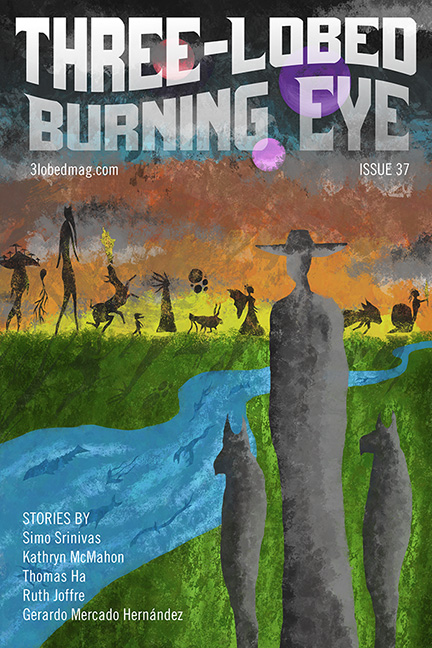A Dark Star Strikes the Stonemason
by Simo Srinivas
1188 words
© 2022 Simo Srinivas
Listen to this story, narrated by the author
After her arrival, it was like she had always been there. The priyayi invented a family for her, a history, a line as long and illustrious as the line of any courtier.
In other words, they lied through their teeth. It was only twenty years ago that they and the Rajah’s mothers, the old queens, blazed into orbit in search of blood and conquest. The Poison Court I had built for them was so new it shone like a jewel, repelling the jungle vines with its lapidary sparkle, and none of its stones had cracked.
The Roro was gold all over, her face too masked in gold. Beneath her raiment there was no living flesh to be seen. The priyayi whispered that her skin was dead. That her skin was like the craquelure ceramics imported from faraway Fifth Kiln, green as celadon.
And between the cracks? Void. Dust. Stars.
• • •
I said I saw through her. “I put it to you,” I said, “that you are a dark star.”
“Perhaps,” the Roro said. “I put it to you, stonemason, that I am the princess you bricked up alive when your rajah no longer had use for her.”
The Roro shrugged as if to say it didn’t matter. After all, I was holding my mother’s chisel. She pushed her shining golden breast against the chisel’s edge.
“If you say I am a star, then strike me,” she said.
I had set my mother’s chisel into stranger rocks on this telluric planet, but I was loath to set any chisel into the Roro. I knew her heart was hungry and that it would pull me in.
“Stonemason,” the Roro said. “Are you afraid of me?”
In answer, I took her hot heavy hand.
• • •
Suhita died standing, a victim of the petrifying disease that plagues her people. Soft-eyed Asmara, grower of vines, followed. Of her own will, it was proclaimed, she drank poison and curled up at the feet of her statue lover, and virtuous widows would do well to follow her example.
The priyayi are liars. I say so, though no one heeds me: who would believe a kasar? The last kasar on the planet, driven mad by grief, whispering her secrets to the unhearing stones.
I told the truth to the Roro, who bent her stiff golden ear to me.
“Asmara stumbled over a loose stone,” I said. “Fell to her knees. The Rajah made certain to misinterpret the gesture.”
He guided the cup to her lips himself, our Poison King. Filial to the last.
“Would you like to go inside?”
The Roro laughed. “You won’t get me that way again.”
Arm in arm we walked to my hovel.
• • •
Night fell. I lay with her. I kissed her golden mouth.
“Why me?” I asked.
“We kasar must make do with each other,” the Roro answered. I perceived it was a joke. We the raw, we the unrefined. The stonemason and the untapped star.
In my bed, the Roro was heavy, hard to turn. Her irradiated limbs trailed glowing dust over mine.
“I’m your mother’s age,” she whispered. “I could be your mother.”
“My mother,” I whispered back, “is dead.”
• • •
I dined. The Roro did not. Under her black quartz gaze I wiped my dripping mouth.
“Walk with me in my garden,” I said.
“Your garden will wither in my wake,” the Roro warned. Was she worried for me? At the corner of her mask, I noticed a crack.
“It is not,” I reassured her, “that sort of garden.”
• • •
Ignoring me, the Rajah spoke the language of the priyayi, where polish is prized. “Bright star,” he began, “bright jewel…”
He never finished. He had noticed Queen Suhita.
“It is her likeness,” he said, unnerved, “her exact likeness.”
Then he gasped. His other mother, Asmara, lay huddled at Suhita’s feet, malachite flashing in her dry dead veins. Her lips flecked with mica. Her stone eyes bulging.
I had built the old queens’ tomb, that much is true. But the night Suhita and Asmara were said to have been sealed away, I unlaid the bricks. I stole them from their rest. I anchored them in my garden, mouths open to the sky.
The Rajah cried out and fled. We watched him, a silken cyclone whirling toward the Poison Court: still gasping, still crying out; now limping, now dragging his leg. His heavy travertine leg.
• • •
“He is poisoning you,” she said. “I tasted it in your kiss.”
Cracks were multiplying over her mask, one creeping tendril after another.
I nodded. “The way he poisoned his mother. And mine. And when I am gone, he thinks, he will be free, free at last, from stone and stonemasons.”
But the Rajah forgets: I built his Poison Court. His Court, his cage. I am immune to its every toxin. And when his mother’s curse has petrified him and the Rajah stands stone dead, I will set him atop a plinth, and I will shape him.
“I see that I need not have come,” the Roro said. “The dark star struck long ago. It fell to this world and was planted, and took root like a jungle vine.”
Our orbit had returned us to the tomb of the old queens.
“Is there anything inside?”
The Roro’s mask was falling away. I saw her starved green face, the nebulae of capillaries burst by her screams to be set free. I saw her sockets, her snarling alabaster teeth. I saw eternity.
“Void,” I said. “Dust. Stars. Are you sure you wouldn’t like to see?”
Hand in hand, we entered.

